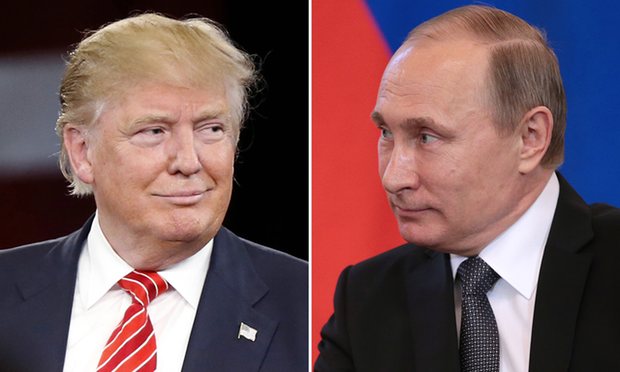A 35-page dossier has galvanized attention to a possible Russian compromise of Donald Trump, with vivid assertions about the President-elect’s vulnerability because of his sexual and financial conduct.
However, the 17 memoranda are not the only evidence which is being investigated. Here are three separate lines of enquiry into links between Moscow, Trump, and his associates.
See also US Podcasts: Trump’s “Fake News” Diversion Over Russia Links
US Feature: Update — “Russia Compromises Trump”
US Analysis: “Russia Compromises Trump” — A Beginner’s Guide
THE DOSSIER
A two-page synopsis of the dossier was presented by the US intelligence community to President Obama, Trump, and Congressional leaders last Friday. It was attached to the longer report on Russian hacking as part of an influence campaign during the 2016 US election — an assessment which Trump, having railed against it for months, finally accepted as “probable” in his press conference on Wednesday.
CNN published the first “exclusive” around the presentation of the synopsis. It did not give details of the claims but assessed their veracity through interviews with members of the intelligence community and other officials and analysis. The memoranda were published in unredacted form by Buzzfeed later in the day.
The origin of the dossier was a commission, by a wealthy anti-Trump Republican donor, of Washington research firm Fusion GPS in September 2015 to compile information on the candidate. After Trump became the Republican nominee, the donor withdrew but Democratic supporters of Hillary Clinton backed further work by Fusion GPS.
The investigation took a turn in June when Fusion GPS turned to the London-based Orbis, run by two former British intelligence officers. One of them is Christopher Steele, a Russian specialist for almost 20 years with the UK’s foreign inteligence service MI6.
Steele used his network of sources and soon began producing short memoranda. Concerned about the revelations, he approached British and US intelligence services, including the FBI, with the findings.
The FBI, in contrast with its approach to Hillary Clinton’s e-mails, was cautious about the investigations before Election Day. Someone connected with the dossier — according to the BBC, Fusion GPS — began circulating material in late October to news outlet. The magazine Mother Jones published a story on October 31, without revealing details of the allegations.
After the election, US intelligence services stepped up the investigation of the claims, assessing that Steele and his compilation of the intelligence are “reliable”. This led to last Friday’s inclusion of the dossier in the briefing of Obama, Trump, and the Congressional leaders.
THE SEX TAPES
But the dossier is not the only source for the allegations about Trump’s sexual conduct during his trips to Russia.
Speaking to the BBC’s Paul Wood in August, a retired British intelligence officer said he was informed by “the head of an East European intelligence agency” that the Russian services possessed a Trump sex tape.
Wood later used an intermediary to ask active CIA officers about the case. They sent the message that there is “more than one tape” with “audio and video” on “more than one date” in “more than one place”. They named the Ritz-Carlton Hotel in Moscow and also the Ritz Carlton in St Petersburg.
Media outlets have reported that the dossier named the Ritz-Carlton Hotel in Moscow. However, none of them appear to noticed that one memorandum also discusses witness statements of Trump’s activities in St. Petersburg.
THE FINANCIAL CLAIMS
According to a “senior member of the US intelligence community”, in April CIA Director John Brennan was presented with a tape recording of a conversation about money from the Kremlin entering the US Presidential campaign.
The tape was passed to the US by an intelligence agency of one of the Baltic States. Because the CIA cannot act domestically against US citizens, a joint counter-intelligence task force was created from six agencies: the FBI, the Treasury, the Justice Department, the CIA, the Office of the Director of National Intelligence, and the National Security Agency.
By July, the task force concluded there was enough evidence to seek a warrant, from the top secret court created by the Foreign Intelligence Surveillance Act, to investigate members of the Trump team — three according to the BBC, four according to The Guardian. The court asked for the focus of the investigation to be narrowed, and the warrant was granted on October 15 to look into two Russian banks, including the interception of electronic records.
The BBC’s Wood spoke to three Trump staff under investigation. One said, “Hogwash”, and another responded, “Bullshit.”
But in late October — after FBI Director James Comey, acting against protocol, announced the re-opening of an enquiry into Hillary Clinton’s e-mails — the Democratic leader in the Senate, Harry Reid, wrote to Comey that he was holding back “explosive information” about Mr Trump.
That letter was sent after the eight top Congressional leaders were briefed by the US intelligence services.
In the autumn, Carter Page — once identified by Trump as one of his foreign policy advisors — was investigated by the FBI on suspicion that he was speaking with senior Russian officials about the lifting of US sanctions if Trump won the election.
The dossier says that, during a trip to Moscow in July to speak at the New Economic School, Page discussed a stake in Russian oil giant Rozneft in return for the end to the sanctions. The advisor spoke with Rozneft head Igor Sechin, according to one of Sechin’s associates.
Amid the FBI investigation, Trump’s staff denied that the candidate had ever had any contact with Page, despite Trump’s effusive praise of him earlier in the year.

